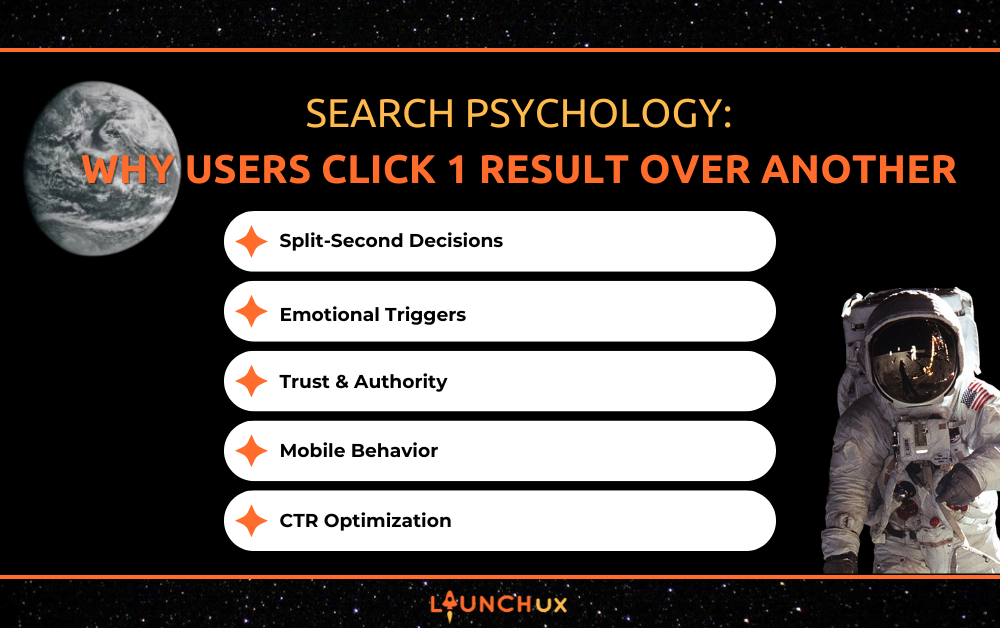When you type a query into Google, Bing, or any other search engine, you’re met with dozens of potential answers. Yet, in a matter of seconds—sometimes less than a single heartbeat—you choose one. Why?
The decision isn’t random. Search psychology shows us that people click results based not only on ranking, but also on trust, emotions, familiarity, and subtle visual cues. Ranking first helps, but the real key is understanding why users click one result over another.
Let’s dive into the hidden search psychology that shapes user behavior—and how businesses can use it to their advantage.
The Split-Second Decision in Search
How Fast Users Decide
Studies reveal that people form impressions of a website in about 50 milliseconds. That same speed applies to search. The brain processes snippets, titles, and brand names almost instantly, often making a decision before the conscious mind fully weighs options.
This means that every element of your search listing—title, meta description, star ratings, and even your favicon—contributes to whether someone clicks.
The Role of Cognitive Bias
Human psychology is full of shortcuts, and those shortcuts guide our clicks:
- Anchoring bias: We assume the first results are the best, simply because they appear first.
- Familiarity bias: If we recognize a brand name in search, we’re more likely to trust it and click.
- Authority bias: Search listings with reviews, awards, or signals of expertise feel safer to choose.
Search engines aren’t just machines—they’re mirrors of human psychology at work.
Titles and Headlines That Trigger Action
Emotional vs. Informational Triggers
A headline that sparks curiosity (“You Won’t Believe How Simple This Trick Is”) works differently than one that provides a straightforward answer (“How to Change a Furnace Filter in 3 Steps”). Both approaches can be effective, depending on user intent.
- Emotional triggers capture attention and push urgency.
- Informational triggers satisfy users who want fast, practical solutions.
Understanding when to use each is key to improving click-through rates (CTR).
Power Words and Their Effect on CTR
Certain words consistently influence behavior:
- “Proven” implies authority.
- “Best” suggests trust.
- “Free” lowers risk.
- “2025 Update” shows freshness.
These “power words” signal value before a user ever visits the page.
Length and Clarity Matter
Long, vague titles get skipped. Concise, clear ones get clicks. The sweet spot? Around 55–60 characters—long enough for context, short enough to scan instantly.
The Role of Meta Descriptions in Search Psychology
Why Descriptions Influence Clicks More Than Rankings
Google doesn’t directly use meta descriptions as a ranking factor, but users do. When search terms appear bolded within the description, people subconsciously feel “this is exactly what I was looking for.”
Even if your page ranks #3 or #4, a sharp, persuasive description can pull more clicks than the result above you.
Crafting Descriptions That Connect
Effective descriptions focus on benefits, not just features:
- “Discover the fastest way to improve your site speed.”
- “Learn how to save money with smarter digital strategies.”
- “Start ranking higher today with proven SEO tactics.”
Each one nudges action by offering a clear outcome.
Trust Factors That Drive Search Behavior
Domain Authority & Brand Recognition
People are naturally drawn to names they recognize. A small local bakery may be just as skilled as Panera, but if both appear in search results, brand familiarity tips the scale.
For small businesses, the key is building niche authority—owning a corner of the market so completely that people remember your name.
Visual Trust Cues
Search isn’t just text anymore. Rich snippets, star ratings, and favicons all send subconscious signals of credibility. A result with 4.9 stars and 300 reviews feels safer than one with no reviews at all, even if both rank the same.
Security and HTTPS
We’ve all seen it: “Not Secure” warnings in the browser bar. Most users won’t even click a result flagged as insecure. Security signals aren’t just about data—they’re about peace of mind in the decision-making process.
How Position Still Shapes Behavior
The Power of the Top 3
Search results are heavily skewed toward the top spots. Studies show that over 70% of clicks happen on the first three results. Page 2? It’s practically invisible to most users.
This doesn’t mean ranking lower is useless, but it does mean businesses must fight harder to win attention when they aren’t at the very top.
When Lower Results Still Win Clicks
Surprisingly, being in position #5–#7 doesn’t automatically doom you. If your title and meta description are sharper, clearer, or more relevant than the results above you, people will scroll and click. A unique offer or irresistible hook can overcome placement.
Mobile vs. Desktop Search Behavior
Thumb-Scrolling Patterns
On mobile, people rely on their thumbs and scroll less. This means the top results matter even more on smaller screens. Eye-tracking studies confirm that mobile users spend less time evaluating—making strong, clear snippets essential.
Voice Search Psychology
With voice assistants, the psychology changes entirely. Instead of scanning a list, users are given one result. This “winner-takes-all” model makes authority and conversational keyword optimization critical for voice search success.
Applying Search Psychology to Your Business
How Businesses Can Optimize for Click Behavior
To influence clicks, businesses should:
- Write titles that balance clarity with curiosity.
- Use schema markup to add reviews, FAQs, or event data to listings.
- Focus on benefit-driven meta descriptions.
Small adjustments in wording often make a big difference in CTR.
Measuring Success with CTR Metrics
Rankings alone don’t tell the full story. Google Search Console shows click-through data—insight into whether your listings are actually convincing users. Regularly reviewing and adjusting based on CTR metrics leads to continuous improvement.
Real-World Examples
Businesses that refine their search listings often see double-digit improvements in CTR. For example, rewriting a generic description like “Local HVAC services in Hagerstown” to “Stay Cool with 24/7 Emergency HVAC Service in Hagerstown” can dramatically increase engagement.
At LaunchUX, we’ve seen firsthand how psychological tweaks—changing a word, adding a star rating, or clarifying benefits—can turn passive impressions into active clicks.
Why Search Is More About People Than Algorithms
Search engines may rely on algorithms, but people rely on psychology. Users click results that feel familiar, trustworthy, and beneficial—often in a split second.
If you want to compete online, ranking high isn’t enough. You need to craft titles, descriptions, and listings that align with human behavior.
At LaunchUX, we specialize in optimizing for both algorithms and the human brain. If you’re ready to attract more clicks, more traffic, and more business, let’s talk.
Request an SEO audit today and discover how psychology-driven search optimization can transform your digital presence.





